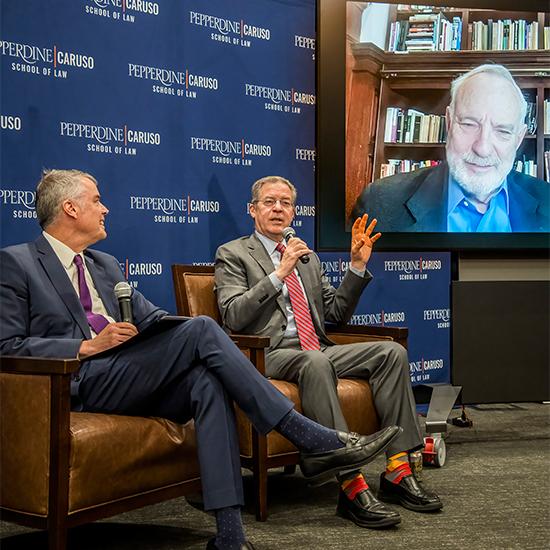Pepperdine Hosts Former Ambassadors in Discussion About Bipartisan Approaches to International Religious Freedom

On Monday, April 8, 2024, the Sudreau Global Justice Institute and the School of Public Policy at Pepperdine hosted former international religious freedom ambassadors Sam Brownback and Rabbi David Saperstein for a discussion about relevant domestic and global issues relating to current trends surrounding international religious freedom. The event, “Bipartisan Approaches to International Religious Freedom,” was moderated by Pete Peterson, dean of the School of Public Policy.
President Gash opened the event with remarks on the importance of religious freedom and Pepperdine’s commitment to the global issue. “Promoting religious freedom aligns with the core values of Pepperdine,” president Jim Gash said in his opening remarks. “Amidst escalating persecution and division, Pepperdine aims to create solutions that bridge divides and safeguard everyone’s God-given right to freedom of conscience and belief.”
Built from the partnership between Pepperdine and the Global Faith and Inclusive Societies, a program created and directed by Knox Thames, international human rights lawyer and senior fellow at the Pepperdine Caruso School of Law and School of Public Policy, along with the Sudreau Institute, the event marks one of the first bipartisan conversations focused on the issue of international religious freedom at Pepperdine.
Thames opened the discussion by addressing an important bipartisan law, the International Religious Freedom Act (IFRA), which was enacted to elevate religious freedom as a higher priority in US foreign policy. He shared how the IFRA, which condemns violations of religious freedom and assists other governments in the promotion of this right, came to fruition. He also shared the critical role both ambassadors played in its passage.
“It was a remarkable moment in US advocacy because, for the first time, Congress had created tools and mechanisms within the State Department to ensure that religious freedom became a foreign policy priority of the United States,” said Thames.
Knox noted that countries that do not prioritize religious freedom suffer terrorism, abuse human rights, and are prone to instability. “The United States is the key actor in promoting religious freedom internationally,” Thames said. “It is something we should be proud of as Americans. It reflects who we are as a people, that we devote significant resources to ensure that everybody everywhere can pursue truth as their conscience leads.”
Brownback then shared his insights on the evolving challenges to religious freedom globally, citing the rise of Hindu nationalism, ongoing Christian-Muslim conflicts in Nigeria, militant Buddhism in Myanmar, and invasive surveillance technologies in China. Brownback stressed the urgency of addressing these issues, noting, “The religious freedom movement is the most important movement on the planet. Now is the time to engage before technology overwhelms our ability to.”
Brownback argues that in order to achieve human rights across the globe, politicians should instead narrowly focus on international religious freedom. “I view this as a cornerstone of human rights,” he said. “If you get this one right, you can build on others. But we’ve been losing ground on human rights throughout the world for 15 years [because we have been focused] on [a] broad agenda.”
As both ambassadors expressed concerns over the potential impact of a polarized election season, Rabbi Saperstein emphasized the importance of promoting democratic values and human rights both in the US and globally to advance religious freedom. “You cannot fight for religious freedom narrowly if you exclude fighting for other human rights as well,” said Rabbi Saperstein. “If you do not have freedom of speech, you do not have freedom of the pulpit.”
Saperstein added, “The work that you are doing at the law school is so important because we still have a long way to go with depth, sophistication, and intellectual richness and rigor in the legal schema of international religious freedom.”